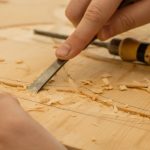Cabinet makers are skilled woodworkers and craftspeople who specialise in designing, constructing, and installing custom cabinets and other types of furniture, primarily for kitchens, bathrooms, and other interior spaces.
As is true with all trades, it’s one that requires time, training and technique. Noted below are a few of the requirements and skills needed to become a great cabinet maker.
What are the duties and tasks of a cabinet maker?
While specific duties will vary based on individual jobs, here are some of the general tasks that a cabinet maker will perform throughout their day-to-day:
- Communicate with the client to understand their needs, then create a detailed plan.
- Make correct estimates of cost to the client.
- Operate computer aided design (CAD) machines.
- Assemble, cut and install cabinets, including handles and hinges.
- Repair or refurbish old antiques or furniture.
- Apply finishes or stains to wood.
- Keep work areas tidy to create a safe environment.
The training requirements for cabinet makers
Many cabinetmakers will undertake an internship or certificate programs at a university, TAFE or vocational school. These courses typically consist of computer-based cabinetmaking, deciphering different kinds of wood, how to estimate and order materials, and how to turn those materials into a finished product.
A degree provides employers with peace of mind knowing that the person they’re considering hiring has been trained properly. Studying industry trends, reading books and frequenting trade shows to keep up with the latest technology are all great ideas too.
Working as an apprentice will help you learn the required skill set to become a cabinet maker, such as using hand and power tools, how to take accurate measurements, joining and fitting techniques, material choice and safety standards.
Employment opportunities for a cabinet maker
Some cabinet makers work for furniture manufacturers who create cabinetry for bathrooms, kitchens, or other prefab wood materials. They are also often employed by construction firms that offer remodelling and renovation services. There are also opportunities for experienced cabinet makers to start their own business, offering bespoke services directly to clients.
What are the risks of cabinet making?
As with any manual labour job, cabinet making has its fair share of risks. These include physical strain due to heavy materials or injury due to tool misuse. Always be aware of potential hazards, and use proper protective equipment to reduce the risk of injury. Insurance for cabinet makers should also be considered.
Thinking about becoming a cabinet maker or opening your own cabinetry business? BizCover is here to help with your cabinet maker insurance. Give us a call or go online to compare quotes and get your insurance sorted in under 10 minutes.
This information is general only and does not take into account your objectives, financial situation or needs. It should not be relied upon as advice. As with any insurance, cover will be subject to the terms, conditions and exclusions contained in the policy wording.
© 2024 BizCover Pty Limited, all rights reserved. ABN 68 127 707 975; AFSL 501769
ABN 68 127 707 975; AFSL 501769


